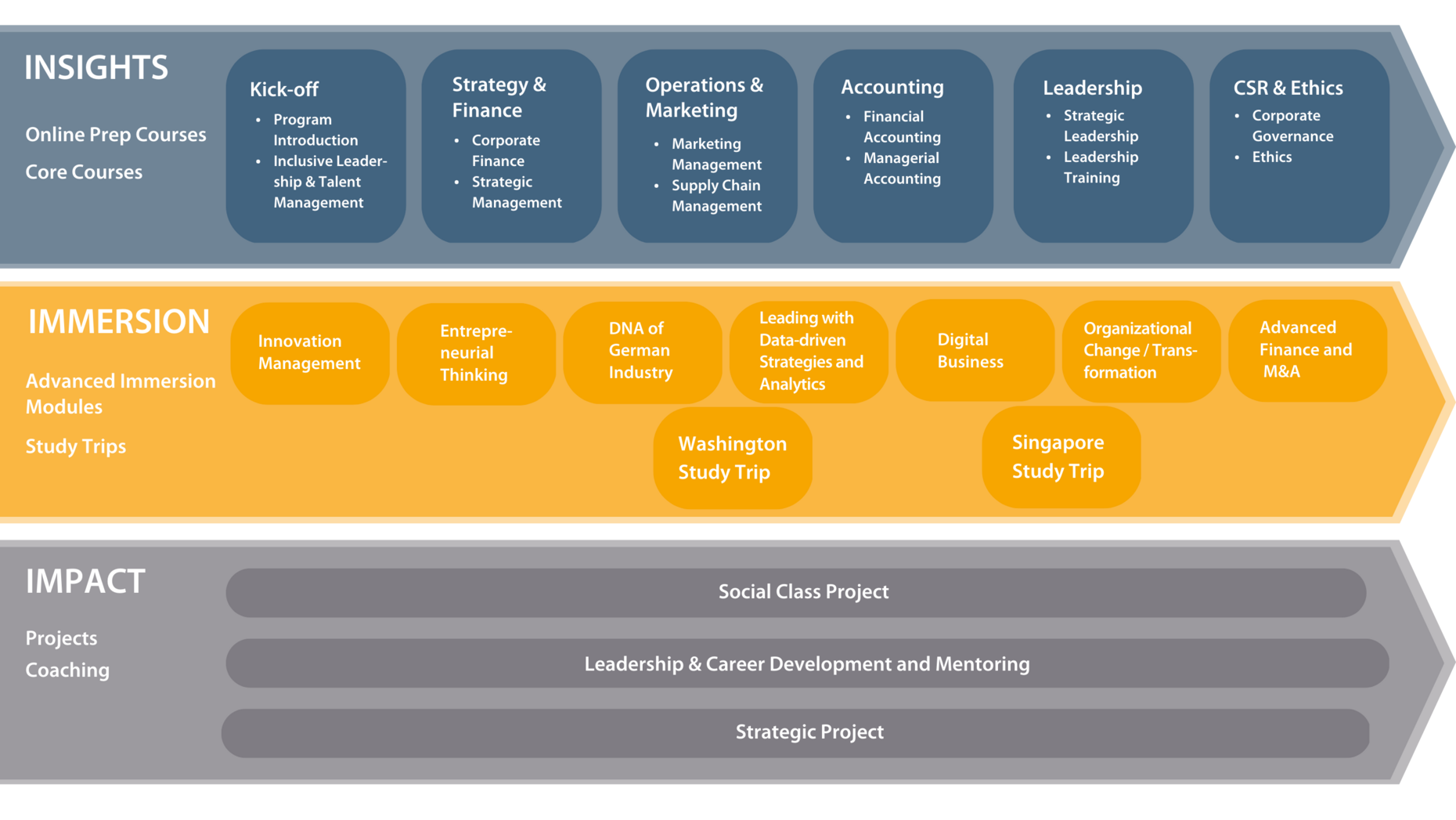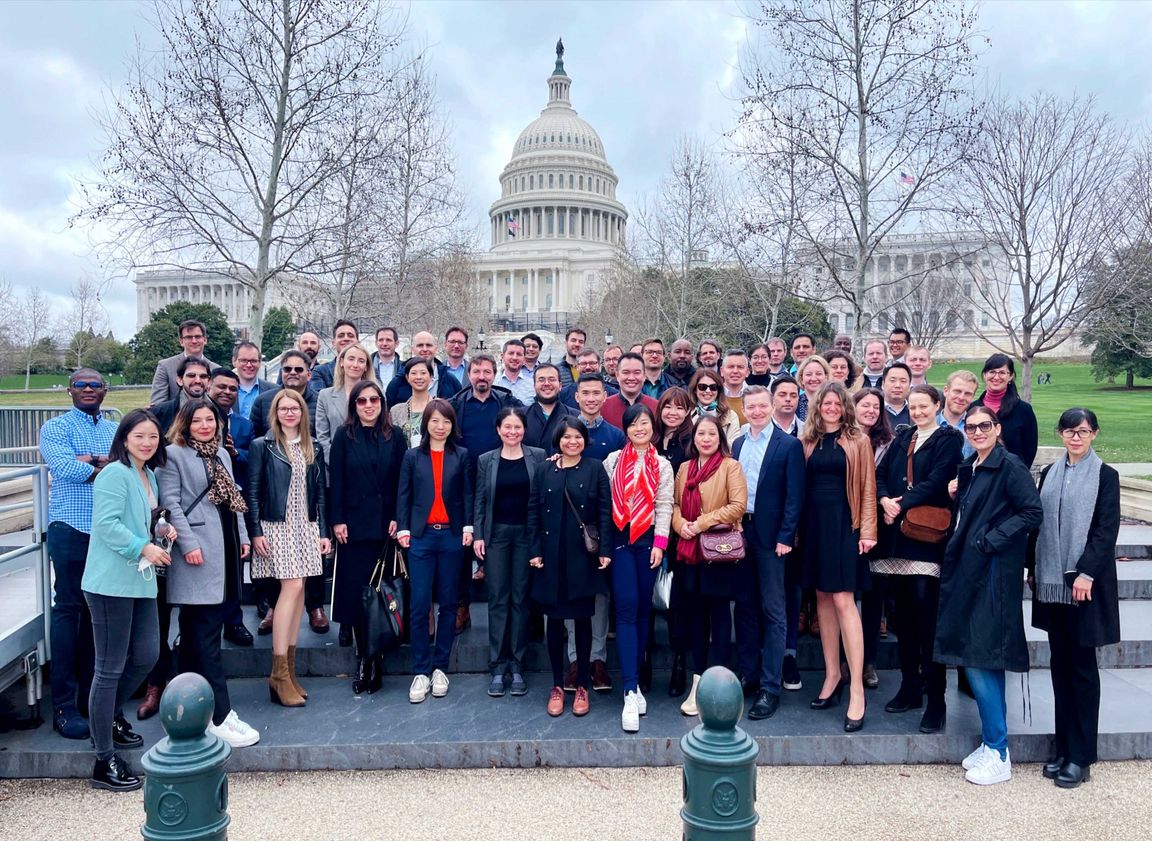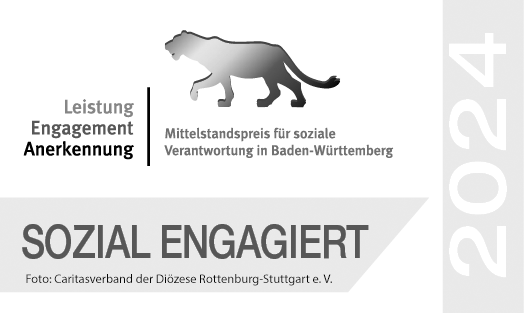Content
You are here: Programs & Courses » Executive MBA Programs for Senior Managers and Executives » ESSEC & MANNHEIM Executive MBA (Part-Time) » Content
Broaden Your Mind and Push Your Boundaries
Knowledge is the basis for sustainable decision-making. The ESSEC & MANNHEIM Executive MBA provides a thorough general management education in the six core courses, from both a practical and an executive perspective. You can then choose from seven elective courses to acquire an in-depth understanding of topics that are highly relevant to your business. In addition, you and your classmates will share your professional experiences in class so that everyone will benefit from the rich diversity.
Our world-class faculty combines a variety of teaching and learning methods. Active learning approaches such as case studies, groupwork assignments and simulations will make up the majority of the classes. Experiments, management simulations and experienced guest speakers will bridge theory and practice, while tools for e-collaboration, e-learning and videos will help you keep in touch with your classmates between the modules.
Perspectives
PROGRAM OVERVIEW
Pivotal Elements of Your Executive MBA Experience
Strategic Project
The Strategic Project is the culmination of the ESSEC & MANNHEIM Executive MBA journey. It allows you to directly apply the knowledge you acquired during the program and develop a solution for a complex business issue or a business plan for a startup. You and your classmates will all develop a project proposal and pitch it to the class. Then, you will either find a team for your project or decide to join the team of a classmate and support their project.
Working on the Strategic Project involves overcoming challenges very different from your daily routine and thus adapting to unfamiliar business environments. In this project, leveraging the diversity of experiences and contrasting viewpoints of all team members will be key to coming up with the best ideas and solutions.
The scope for a Strategic Project could be developing a growth or new business strategy for an established company, assessing a merger or acquisition between two existing companies or even setting up a startup. Past projects include developing a business plan for a long-term storage solution for medical images, designing a commercialization strategy for a start-up, devising a talent-on-demand strategy and investigating a business case for a portfolio expansion in a new market.
Sustainability in Action
The Social Class Project gives you the opportunity to make a positive contribution to society and provides a meaningful project management challenge. Starting at the beginning of the program, it will be the responsibility of the entire class to acquire, plan, coordinate, organize and implement a project autonomously. Irrespective of the nature of the project, which may be humanitarian, social, educational or ecological, you will need to directly apply your management skills. Past classes started a solar energy project for low-income families and small businesses in Lebanon, organized a charity run raising money to pay school fees for children and launched a campaign to combat blood cancer.
Study Trips
In addition to the multicultural make-up of the class and exposure to the cities and cultures of Paris and Mannheim, the program includes study trips to Asia and the United States in collaboration with renowned partner business schools. These are designed to immerse you in the local life of the specific culture.
The study trip to Washington, D.C. provides the ideal backdrop to studying and addressing the most pressing global issues. Effective global leaders must cultivate a panoramic understanding of different disciplines, sectors and cultural divides in order to solve our most vexing problems. The program is designed to engage leaders in a dynamically integrative approach that equips them with a suite of tools necessary to work in a volatile, uncertain, complex and ambiguous world. This course is specifically designed to deliver applied skills, as the curriculum marries rigorous theory with proven strategies for effective practice.
The study trip to Asia aims to show the many faces of Asian business and the Asian ecosystem, provide inspiration for future business and indicate how to manage sustainability and growth. In order to achieve these objectives, you will be provided with a comprehensive and deep understanding of changing business and society in Asia.
Outdoor Leadership Training
The main theme of the Outdoor Leadership Training organized and conducted by the French provider SCYFCO is “Leadership and team spirit”. It will take place far from conventional training facilities over a period of three days. You will acquire and develop skills to enhance awareness and decision-making in complex situations, communicate better with one another, clarify speech, listen to increase engagement and group dynamics, and improve collective efficiency through better knowledge of yourself and others.
Core Courses
In today’s highly uncertain and rapidly changing business environment, the development of employees’ potential is as important as the effective utilization of their existing knowledge and skills. We will learn major approaches and practice critical skills that managers need to accomplish these goals.
Knowledge and skills taught in this module will help to:
- Design a comprehensive talent management system in line with an organization’s strategy
- Implement state-of-the-art instruments for the recruitment, development, motivation and assessment of employees
- Diagnose and develop employees’ potential
- Identify and develop your own talent in a systematic evidence-based manner
This course is designed as a rigorous introduction to the core tools and principles of modern corporate finance. It will serve both as an introduction for those who want to specialize and take more advanced courses in finance later on, and as an overview for those pursuing other disciplines.
The main objectives of this course are to enable participants to assess an investment proposal and understand the valuation of bonds, stocks and companies; understand the terminology, main concepts and most relevant subjects in corporate finance including capital structure, risk management, payout policy and mergers and acquisitions; and discuss and raise questions about reports and recommendations by corporate finance consultants within these areas.
Why are some companies more successful than others? The fundamental question of strategy is how companies can attain and sustain competitive advantage. In this course, we will analyze the sources of competitive success among companies in depth and develop the skills and knowledge necessary to be an effective strategy analyst. This course takes the perspective of general managers or integrators, that is, managers who make decisions that cut across the functional areas of the company (e.g., marketing, finance, operations, etc.). Strategy courses are also relevant to participants interested in careers as entrepreneurs or consultants. Tackling the complexity of analyzing competition and making strategic decisions is important for all managers in this era of innovation, uncertainty and changing industry and corporate boundaries.
The course’s primary objective is to introduce you to a broad range of the most important analytical frameworks and concepts of strategic analysis. The tools we will cover are designed to help you analyze complex business situations more effectively. They are also intended to help you to ask the “right questions” in your dealings with superiors and clients by focusing your attention on the most important economic factors affecting competition and the success of companies.
Several forces are transforming the structure and substance of the marketing profession. Marketeers are seeing increasingly faster changes in the marketplace and are barraged with an ever-growing amount of information. While many view traditional marketing as an art and some view it as a science, new marketing increasingly looks like engineering.
This course, combined with a collection of leading-edge software models (which will be made available to participants) provides participants with the know-how and tools to collect the right information and perform the required analysis to devise better marketing plans, understand the market structure, quantify clients' preferences and optimize pricing. At the end of this course, participants will be able to prepare the development strategy in light of market developments and the main trends that may impact the company’s growth, and manage the marketing and communication actions in conjunction with the company’s various departments located across multiple sites to promote the company’s products and/or services in all markets.
Supply chain management is concerned with the management of all processes that aim to satisfy customer demand. This includes managing interrelated product, financial and information flows. These flows typically involve multiple players, such as suppliers, manufacturers, wholesalers and retailers, each of them having their own objectives. At the same time, these players are dependent on each other to serve the end customer. Supply chain management addresses the interplay between individual objectives and overall supply chain performance. The key insight is that supply chain coordination can generate a win–win situation, benefiting all supply chain members.
This course introduces concepts and methods that are useful for understanding supply chain management decisions. Important elements include supply chain design, inventory management and supply chain coordination. Upon completion of this course, participants will be familiar with key supply chain management decisions. They will understand how these decisions influence supply chain performance and they will understand the key trade-offs underlying these decisions. In particular, participants will be able to analyze and assess the alignment of a company’s supply chain with its overall strategy.
The purpose of this course is twofold. Firstly, participants will learn the fundamentals of financial accounting in accordance with International Financial Reporting Standards (IFRS), the global language of business in terms of financials. Its aim is to familiarize participants with the basics and concepts of financial reporting, to understand underlying problems and solutions, and to relate this to their own business environment. Secondly, this course will enable participants to understand financial accounting and reporting from a leadership perspective: They will be able to analyze financial data provided to capital markets and understand the link between external reporting pursuant to IFRS and their company’s internal decision-making.
Managing a company’s costs is a key factor for success in today’s business environment. Sound knowledge of managerial accounting and control is thus important for managers, irrespective of their functional backgrounds. The course therefore covers the basics of cost accounting and managerial control, and introduces participants to key methods such as absorption costing, activity-based costing and cost–volume–profit, make-or-buy and variance analyses. The course also aims to introduce participants to target costing, a key method for designing competitive products.
Increasing calls for corporate social responsibility and sustainable business conduct make measuring and managing performance comprehensively more challenging. Consequently, the course covers one of the most widely used instruments to better manage a company’s performance internally: the balanced scorecard. With the help of strategy maps, users can implement strategy and measure performance in a multidimensional manner, which makes it easier to attain an organization’s goals and satisfy its various stakeholders.
This course is based on two assumptions. Firstly, that most, if not all, participants will have the opportunity to become leaders, in some cases, of large organizations. Secondly, over time, success as a leader will depend less on individual skills, no matter how adept one may be, and more on the ability to influence and engage others in the pursuit of collective goals. Research has shown that this progression is characterized by a series of transitions – from individual contributor to manager of others, from manager of others to manager of managers and so on. Research has also demonstrated that career failures are often associated with an individual’s failure to successfully make these transitions. Ironically, because these failures are largely predictable, we can anticipate them and, with some preparation, help leaders understand how to avoid them.
The objective of this course is to help prepare participants to better understand the common challenges and pitfalls that they will encounter as their career progresses and they become leaders.
Classic corporate governance frameworks aim to protect shareholders’ interests and reduce the risk profile of the company in which they invested. The emerging corporate social responsibility perspective identifies additional risk dimensions, e.g. climate change (TCFD), and extends the view to other parties with an interest or concern in the business. Relationship management for internal and external stakeholders is therefore becoming increasingly important for companies.
Consequently, the role of good managers and their leadership styles also need to be adapted to changing priorities. The course aims to have participants:
- understand corporate governance frameworks,
- learn about current regulations (e. g. in the EU): a corporate social responsibility view of companies’ governance structures and disclosure requirements, and
- consider companies from an ESG analyst perspective.
This course aims to develop a plenary dialogue between participants on important issues stemming from their own ethical opinions and questions concerning personal choices and the implications of leadership responsibilities. It will then guide them in how to use this dialogue to find new ways of resolving ethical dilemmas and choices. Specific cases and real-world ethical (business) questions are used to illustrate the various aspects of this area.
Advanced Immersion Modules
Choose from a number of courses that will complement your skill set. Current courses include the following.
Entrepreneurial Thinking will provide participants with a theoretical foundation and a set of practical tools for exploring and creating new futures for new or existing ventures. The objective of the course is to make sense of the practical reality of such ventures, in particular the processes that expert entrepreneurs and intrapreneurs have been found to use for dealing with its many challenges. By the end of the course, participants should be able to think about the steps and challenges involved in developing new ventures in a more structured, rigorous and informed manner.
Venture Financing will build participants’ confidence when talking to potential investors and enable them to ask and raise relevant questions. The main objectives are to gain a good understanding of the world of investors and what attracts and repels them, to identify their level of interest, to tailor the presentation of a project for potential investors and to become familiar with the main terms of a partnership.
Intrapreneurship is the creation of new ventures within an existing company. Participants will learn how to analyze the company’s policies and potential changes in terms of development and internal and external growth, help define the direction in which they want to develop their business, also taking internal resources and external growth opportunities into account, and develop the operational strategy to be implemented in the short and medium term by identifying the available resources, any threats and the challenges ahead.
Many companies perceive innovation as the most effective way to achieve significant growth. However, CEOs also view innovation management as a multifaceted task, one that companies struggle with. This course introduces participants to the key elements of innovation management, including novel ways to generate ideas, key elements of product and service design, business model innovation, processes to develop breakthrough innovations and ways to create a culture of innovation.
Since innovation is a quickly developing and practical subject, the course is largely hands-on. Participants are expected to learn tools and techniques, discuss their applications and then apply them in class exercises and a major simulation run in specifically selected teams. They will also gain deeper insight into the role of an innovation manager in a company today with the help of case studies, a video case study, many practical examples and possibly, a guest speaker.
The specially created course materials include tools and techniques for identifying customers’ hidden needs (needs that customers have not yet recognized themselves), processes to drive breakthrough innovation projects involving radical ideas and technologies for new markets and potentially, with new business models; and approaches to creating a culture of innovation. In previous years, many of these tools were applied in MBA projects and in the participants’ own organizations.
The aim of this course is to provide participants with a deep understanding of the functioning of the German economy, including an up-to-date overview of the economic, institutional and political situation in Germany. It will focus on business priorities and economic behavior of relevant economic stakeholders within the German economy, such as German entrepreneurs, small and medium sized enterprises (SMEs), hidden champion companies and large family-run companies, using practical examples. More specifically, typical growth strategies, managerial success factors as well as failure traps of German companies will be discussed and analyzed based on practical case studies of several companies from various sectors. Some time will also be devoted to analyzing the local and national institutional setup and how the German economy has overcome recent economic crises.
Participants will visit successful German companies to learn about the small but innovative German craftsmanship company and the typical German hidden champion company (> 800 employees) and its management up close. They will also gain firsthand insights from top managers and owners into sustainable growth strategies, get to know three remarkable start-ups and discuss the role of social start-ups and trends in the sharing economy. Based on all this, time will be devoted to bringing the insights gained from the case studies and the company visits in line with contemporary theories and concepts from strategic management, organizational behavior and corporate governance research.
Most companies are taking their business processes digital and have placed data at the very heart of their strategies. This online course immerses its participants in data and analytics. In today’s world, it is important to act as a digital data leader to contribute to digital transformation. Participants will discover two data-fueled start-ups through unique case studies: Foxintelligence (market intelligence on online consumers) and Bloom (problem-oriented versus data-oriented positioning). In addition, ESSEC’s academic experts on data constantly update their courses on how to lead with data-driven strategies and master analytics as a competitive advantage.
This online course is split into three main sections. The first, “Mastering data-powered strategy to build a data-fueled powerful organization”, explores strategy, value creation, competitive advantage and the implementation of data and analytics. Since it all starts with data governance, in the second section, which focuses on “Developing data-powered business with AI”, participants will identify key types of data for their companies, implement new KPIs and experiment with AB testing techniques. The final section is “Discovering data-fueled start-ups and acquiring data leadership”.
Change Management
An estimated 88% of change management initiatives fail, according to a recent Bain & Co. survey. In digital transformation initiatives, the failure rate is even higher. There are many reasons for failure including underestimating the magnitude of the change process, overlooking the emotional aspects involved and ineffective leadership. In this course, we will examine the change process structures as well as the human side of effective change. The course has four key parts:
- How companies that create change-friendly identities propel or hinder change.
- Examining the change implementation process including behavioral and cognitive aspects.
- Insight into your own change management style.
- Promoting a digital and learning culture.
AI for Business
Data science and artificial intelligence (AI) promise to revolutionize various sectors. The goal of the first session is to clarify the relationship between data and AI, and how we use the former to train the latter to complete new tasks in computer science. The second session focuses on how executives can set objectives and milestones that define a data and AI strategy, and how they can create teams equipped to tackle the many challenges of the journey toward a data-driven organization. The last session will set the stage for a discussion on ethics and why it is necessary for organizations wanting to deliver long-lasting value through their AI projects and assets.
Decision Analytics
Decision analytics, also called prescriptive analytics, is the last stage of business analytics. It concerns the decision-making stage, after data description and predictive analytics. Participants will be introduced to analytics tools that help to make the best possible decisions in the event of complex choices and planning situations. Such situations, for which one’s common sense, pocket calculator or intuition is generally not sufficient to clearly see how to proceed and what to do, include locating facilities, plants or selling points, sizing human resources, planning production and inventory, designing a telecom or logistics network, assigning staff to tasks or missions and scheduling activities in a large project. High stakes and multiple parameters often lead managers to seek analytics tools to support their decision-making, in particular linear programming to optimize operations planning and decision-making. The focus will be more on the ability to analyze, model and implement a decision problem than on the proper solving techniques, although participants will learn to use some solving tools.
In the age of disruption and invention, businesses need the ability to adapt more than ever before. Agility, adaptability and transformation get businesses to what they need to do: change. But change can rarely be prescribed and managed top-down. It takes time and, above all, broad support from many stakeholders.
Based on the example of the organizational structure for sustainability, this course aims to provide an insight into internal corporate transformation processes. Since people are always at the center of these processes, the discussion will include corporate culture and New Work.
In this course, participants:
- learn the basic theoretical concepts regarding organizational change management and transformation science,
- exchange ideas about possible organizational structures for sustainability as well as the potential implications of sustainability-related change on organizations and their employees,
- gain insight into methods that can be applied to successfully manage such transformations while engaging the organizational members and
- engage in the discussion about New Work and its potential for corporate culture and agile business transformation.
Advanced Finance
This course explores corporate M&A activities from a financial perspective. Topics covered include an introduction to the M&A vocabulary and process, DCF valuation and synergies, valuation using multiples, theories and empirical evidence of M&A activities, negotiation and takeover defenses, structuring the deal and financial implications of M&A. Ultimately, participants should be able to understand how valuation plays a central role in the strategic decision-making process, carry out a valuation analysis of a complex corporate and financial structure, and analyze the terms of a deal in a knowledgeable way, understanding its value implications as well as the incentives and motivations of the major stakeholders.
M&A Strategy
Blurring industry boundaries and falling barriers to entry due to rapid technological change and business model innovation have significantly increased the pace of competition. The use of mergers and acquisitions has emerged as a key response that allows companies to reconfigure their strategic capabilities and resources in order to enhance their competitive positioning. This course on M&A strategy discusses the use of M&A as a strategic response and the management challenges that arise, including acquisition integration.
Business Law
Legal issues may take up as much as 25% of a CEO’s time. In fact, about 50% of US companies have lawyer directors. Legal literacy can generate tangible results in the ordinary course of business and will be decisive for success during the transformational moments of a business: start-up, raising capital, restructuring and mergers and acquisitions. This course is an introduction to strategic legal thinking for business people. Understanding the legal constraints and tools, selecting the various arrangements that a company may enter into to carry on business and structuring these transactions are critical for effective, ethical, fruitful and profitable long-term relationships between different parties.
Contact Person














